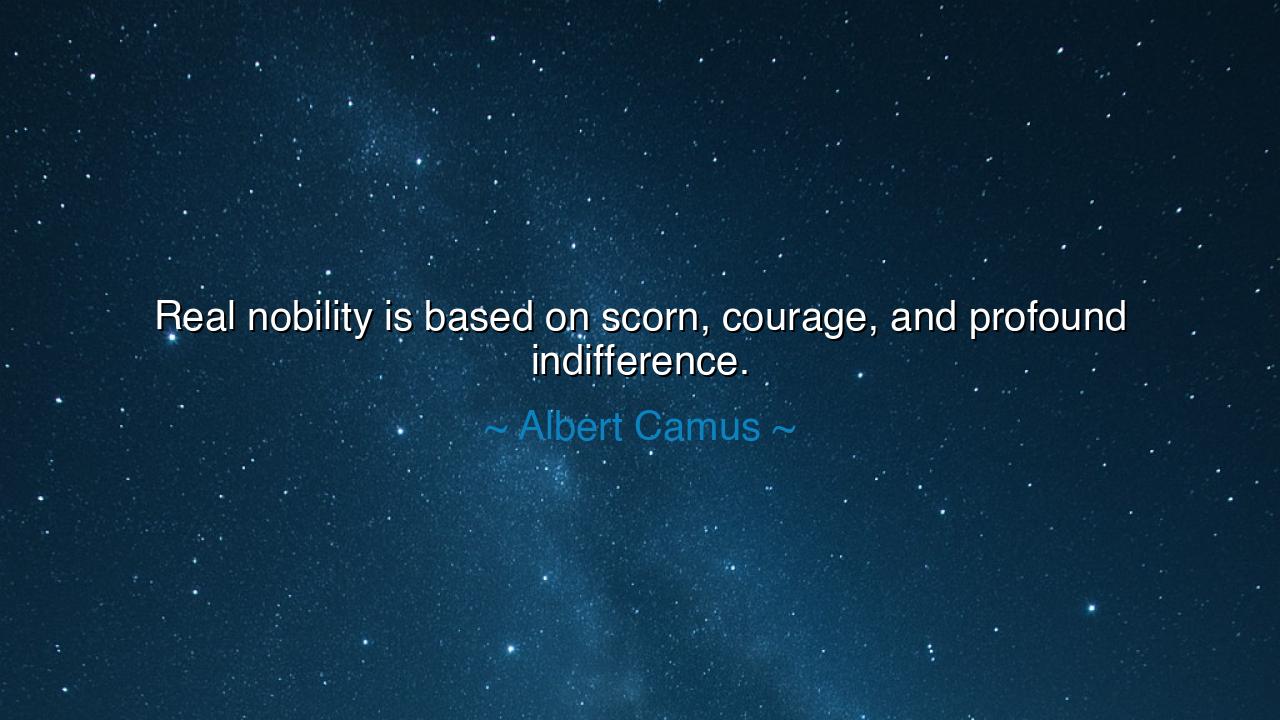
Real nobility is based on scorn, courage, and profound






"Real nobility is based on scorn, courage, and profound indifference." — Thus spoke Albert Camus, a man who gazed into the heart of human absurdity and found there neither despair nor escape, but a strange kind of freedom. His words are not the polished wisdom of a court philosopher, but the hard-earned truth of one who has wrestled with meaning in a world without gods. To understand them is to walk upon the edge of existence itself, where pride, defiance, and serenity become one.
In saying that real nobility arises from scorn, Camus does not speak of arrogance or contempt toward others, but of the soul’s sacred rejection of falsehood. To scorn is to look upon the illusions of power, wealth, and vanity and say: “You have no hold over me.” The noble soul sees the emptiness behind society’s golden masks — the hollow chase for fame, the trembling obedience to convention — and turns away, unbowed. Like the philosopher Diogenes, who lived in a barrel and mocked the pretensions of kings, the noble spirit stands apart, scorning what is base not out of hatred, but out of purity. This scorn is the first fire that purges weakness and prepares the heart for freedom.
But courage — ah, that is the second pillar. For what good is scorn if one trembles before the cost of truth? Courage is not the absence of fear, but the refusal to kneel before it. It is the quiet resolve to act rightly when the world would have you yield. Consider Socrates, standing before his judges, calm and unbroken. Offered life in exchange for silence, he chose death rather than betray his conscience. His courage was not loud or furious, but steady as stone. Such courage does not seek victory, for victory is uncertain; it seeks only to remain faithful to the truth of one’s being. This is real nobility — to live without deceit, even when the price is everything.
And then comes the final and rarest gift — profound indifference. To be indifferent, in the Camusian sense, is not to be cold or apathetic. It is to reach a serenity so deep that neither praise nor blame, fortune nor ruin, can disturb the soul’s stillness. The noble spirit, having scorched away illusion and faced the abyss with courage, at last discovers peace in detachment. It loves the world, yet clings to nothing. It fights for justice, yet desires no reward. It acts, but without need for recognition. In this indifference lies the final freedom — the freedom of the sage who smiles beneath the storm, untouched by the world’s madness.
Let us recall the story of Marcus Aurelius, emperor of Rome and philosopher of the Stoic path. Amid war, betrayal, and the crushing weight of empire, he remained tranquil, recording by lamplight the meditations that would guide souls for millennia. Surrounded by opulence, he scorned luxury. Confronted by fate, he showed courage. And when victory and defeat came in equal measure, he met them both with indifference. “You have power over your mind,” he wrote, “not outside events.” In his life we see the living image of Camus’s triad — scorn for vanity, courage before adversity, and indifference to destiny.
To live thus is no small task. The path of real nobility is steep and lonely. It requires that we shed our need for approval, our fear of loss, and our hunger for certainty. Yet the reward is immense: a soul that belongs wholly to itself. When one stands firm in truth, loves without possession, and faces the world with unflinching serenity, then one partakes in the same flame that burned in Camus, in Aurelius, in all those who chose dignity over comfort.
The lesson, then, is this: Be noble, not by birth, but by soul. Scorn what is false; be brave in what is true; and let go of what you cannot control. Each day offers a chance to practice this. When others boast, be silent. When fear rises, act anyway. When fate turns against you, smile and remain unmoved. These are not grand gestures, but quiet acts of greatness. For the nobility Camus speaks of does not shine in palaces — it burns quietly in hearts that refuse to bow.
So, my child of the future, walk the earth as one who belongs to no master but truth. Let your scorn cleanse you, your courage fortify you, and your indifference free you. The world may rage, but the noble soul endures, unbroken and serene — a torch of dignity carried through the storm.






AAdministratorAdministrator
Welcome, honored guests. Please leave a comment, we will respond soon